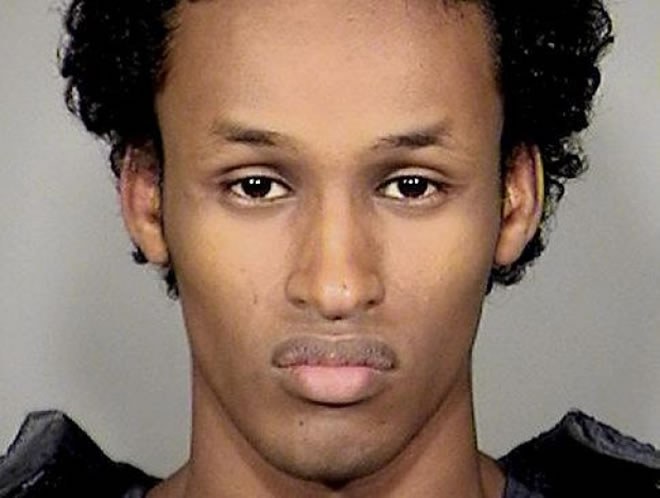
Mohamed Mohamud

By Ramona DeNies
Thursday, February 06, 2014
advertisements
Mohamed Mohamud has been cast in many roles: as a simmering potential terrorist, as a teenager manipulated by FBI agents, and most of all as Portland’s “Christmas tree bomber.”But now he’s poised to play a new part. Nine months after Edward Snowden revealed massive unchecked government surveillance, Mohamud’s case could challenge methods used for years by the U.S. government to spy on all of us.
Mohamud still awaits sentencing after being convicted last year of attempting to detonate a phony bomb near Portland’s holiday tree-lighting ceremony at Pioneer Courthouse Square in 2010.
Three months ago, federal prosecutors disclosed the government may have built its case against Mohamud using warrantless surveillance gathered under the Foreign Intelligence Surveillance Act amendments of 2008.
Mohamud’s defense team, in a Jan. 13 court filing, points to what it calls the government’s “knowing and intentional” violation of the law.
The case—along with another in Colorado—could derail methods used for years by theNational Security Agency, the FBI and others to gather evidence through warrantless overseas wiretapping.
Patrick Toomey, a staff attorney with the National Security Project of the American Civil Liberties Union, says Mohamud’s case could be perfectly timed, given Americans’ growing concerns about government invasion of their privacy.
“No court has yet challenged the constitutionality of the law,” says Toomey. “I think you’ll see a lot of attention focused on the Oregon case.”
The defense team wants to know whether the government used other spying methods disclosed by Snowden, a former NSA contractor, including tracking Mohamud’s Web activity, installing computer malware to spy on him through his laptop camera, and monitoring him while he played video games such as Halo.
Tung Yin, a Lewis and Clark Law School professor who specializes in national security issues, says millions of Americans will never know whether the government has spied on them.
But because the government has now admitted that the FISA amendments act played a role in Mohamud’s trial, Yin says the defense team’s request for more information could establish a way to question whether such techniques can legally be used against U.S. citizens.
“A lot of defendants just plead guilty, so they lose the right to challenge,” says Yin. “Snowden’s disclosures have opened eyes. [Mohamud]’s in the right place at the right time.”
Mohamud, a former student at Oregon State University, was convicted Jan. 31, 2013, of the attempted detonation of a bomb, provided by undercover agents, near the 2010 holiday tree-lighting ceremony in Portland’s Pioneer Courthouse Square.
Mohamud’s lawyers failed to convince a federal jury that the FBI entrapped the Somali-American, whom agents described in emails as a “conflicted/manipulable kid” while providing him with rent money and encouragement.
Now they say the recent disclosure by the government proves their case was hamstrung from the outset. Because Mohamud “did not know that this statute was used to gather information about him” until three months ago, he was denied the right during trial to challenge the evidence.
The New York Times has reported that the Justice Department in October 2013 notified one other criminal defendant about warrantless wiretapping: a man in a Colorado case accused of trying to aid the Islamic Jihad Union, a terrorist organization based in Uzbekistan. His case has not yet gone to trial, but his lawyers have said they will challenge the legality of the NSA’s methods.
Gerri Badden, spokeswoman for the U.S. Attorney’s Office in Portland, says prosecutors declined to be interviewed for this story but plan to file a Feb. 13 response to the defense’s motion for more disclosure about the government’s evidence and methods. Mohamud’s defense team, led by Chief Deputy Federal Public Defender Stephen Sady, also declined to comment.
Joshua Dratel, chairman of the national security committee of the National Association of Criminal Defense Lawyers, says government practice has been to selectively withhold evidence from defendants. A ruling in the Mohamud case that opens the door to more disclosure could lead to a re-examination of many other cases.
“The government has never been forced, in a FISA context, to describe their process in meticulous detail,” Dratel says. “It’s an uneven playing field tilted in the government’s favor.”
But Mohamud’s defense attorneys may hope the field has tilted back.
In its 66-page memo, Mohamud’s defense team says “the need for secrecy has been reduced by the Snowden disclosures.... Prior to trial, the mass collection of telephone and Internet content and metadata was speculative; now it is fact.”
Carrie Leonetti, an associate professor at the University of Oregon’s School of Law, says secret surveillance gives the government incentive “to play fast and loose with the rules.”
“Any vehicle to challenge the warrantless surveillance we now know the government engaged in,” she says, “is a rare and important thing.”